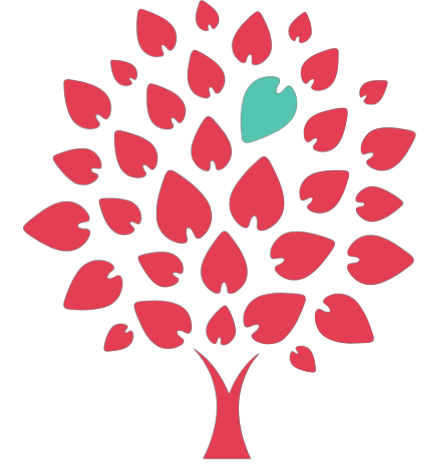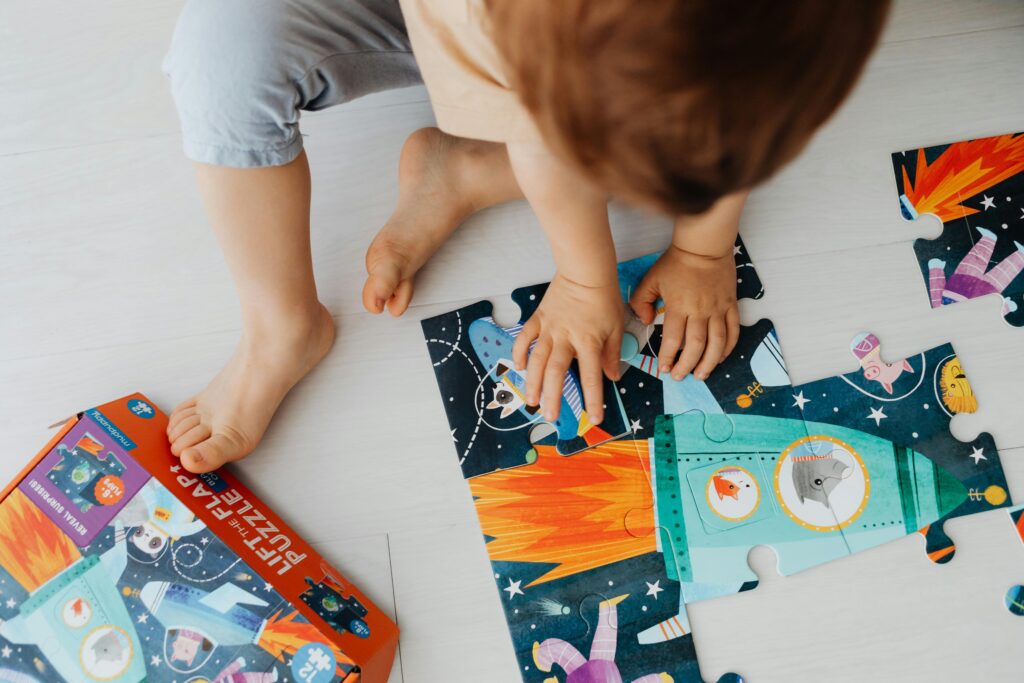As both a parent and a teacher, I was always on the lookout for toys and activities that would benefit my children and keep them away from the TV or iPad. Activities that they could play with alone or with a companion and could develop more than one skill at a time. One timeless activity that checks all the boxes? Puzzles! From chunky wooden pieces for toddlers to intricate jigsaws for older kids, puzzles have been a staple in my home and classroom for years.
Puzzles are more than just a quiet activity to keep little hands busy, they are brain food. They foster critical skills like problem-solving, spatial reasoning, and hand-eye coordination. They also teach patience and perseverance, qualities that help children far beyond the playroom. There is no instant gratification with a puzzle. Let’s not forget the joy of completing a puzzle: that “I did it!” moment is a confidence booster like no other.
My observations as a parent and as a teacher is that puzzles benefit children’s:
Cognitive Development: Puzzles challenge kids to think critically and identify patterns, laying the foundation for skills in math, science, and reading.
Fine Motor Skills: Picking up and fitting pieces helps develop the precision and strength needed for writing and other fine-motor tasks.
Language Skills: Puzzles with letters or words can build vocabulary, while themed puzzles spark conversations about animals, vehicles, or geography.
Social Skills: Working on a puzzle with a sibling or friend teaches cooperation, sharing, and teamwork.
Emotional Growth: Completing a challenging puzzle boosts self-esteem and teaches the value of persistence.
I can’t think of many other activities on the market that can benefit a child as holistically as this!
Choosing the Right Puzzle by Age
Here’s a breakdown of what to look for at each stage of development:
0–2 Years: Exploring Through Touch
For infants and toddlers, puzzles are all about exploring textures, shapes, and colors. At this stage, look for:
- Chunky wooden puzzles with easy-to-grasp knobs or handles.
- Texture puzzles that introduce different materials like felt, sandpaper, or soft fabric.
- Sound puzzles with built-in noises (think animal or vehicle sounds) to engage multiple senses.
These puzzles help with sensory exploration, hand-eye coordination, and shape recognition. Keep it simple—2–3 pieces are more than enough for little learners.
3–4 Years: Matching and Sorting
Preschoolers are ready for puzzles that challenge their matching and sorting skills. Consider:
- Peg puzzles with letters, numbers, or animals.
- Simple jigsaw puzzles with 4–12 pieces.
- Themed puzzles that align with their interests (dinosaurs, vehicles, or favorite animals).
This is the age where they start developing problem-solving skills and spatial awareness. Sit with them as they work, asking guiding questions like, “What happens if you turn the piece this way?”
5–6 Years: Thinking Ahead
By the time your child enters kindergarten, their ability to strategize and think ahead grows. Ideal puzzles include:
- Jigsaws with 24–50 pieces.
- Floor puzzles that involve large pieces for a tactile, full-body experience.
- Puzzles with patterns or sequences to introduce logical thinking.
These puzzles help refine fine motor skills and improve their ability to see the “big picture” while working through smaller details.
7–8 Years: Independent Problem-Solvers
For school-age children, puzzles become a more independent and rewarding activity. Look for:
- Jigsaws with 100+ pieces.
- 3D puzzles like models of famous landmarks.
- STEM puzzles involving gears, magnets, or circuitry.
At this stage, puzzles enhance patience, concentration, and perseverance while still being fun.
In a world full of flashy tech toys, puzzles remain refreshingly simple yet incredibly effective. They bridge the gap between play and learning, offering benefits that grow with your child. As a busy working parent, staying organized can be a challenge—especially when it comes to finding the perfect birthday gifts for kids’ parties. Puzzles are a fantastic option, and the best part? You can conveniently order them online!

تعزيز العقل: دليل الألغاز
كأم ومعلمة، كنت دائمًا أبحث عن ألعاب وأنشطة تفيد أطفالي وتبعدهم عن التلفاز أو الآيباد. أنشطة يمكنهم اللعب بها بمفردهم أو مع رفيق، وتساعدهم على تطوير أكثر من مهارة في وقت واحد. واحدة من الأنشطة الكلاسيكية التي تلبي كل هذه المتطلبات؟ الألغاز! من القطع الخشبية الكبيرة للأطفال الصغار إلى الألغاز المتشابكة المعقدة للأطفال الأكبر سنًا، كانت الألغاز عنصرًا أساسيًا في منزلي وفصلي الدراسي لسنوات.
الألغاز ليست مجرد نشاط هادئ يشغل أيدي الصغار، بل هي غذاء للعقل. فهي تعزز مهارات حيوية مثل حل المشكلات، والتفكير المكاني، والتنسيق بين اليد والعين. كما تُعلِّم الصبر والمثابرة، وهي صفات تفيد الأطفال في حياتهم اليومية. لا توجد مكافأة فورية مع الألغاز، ولكن لا يمكن إنكار فرحة إكمال اللغز: تلك اللحظة التي يقول فيها الطفل “لقد فعلتها!” تعزز ثقته بنفسه بشكل لا مثيل له.
ملاحظاتي كأم ومعلمة هي أن الألغاز تفيد الأطفال في:
- التطور المعرفي: الألغاز تُحفز الأطفال على التفكير النقدي وتحديد الأنماط، مما يضع أساسًا لمهارات الرياضيات والعلوم والقراءة.
- المهارات الحركية الدقيقة: التقاط القطع وتركيبها يساعد على تطوير الدقة والقوة اللازمة للكتابة والمهام الحركية الدقيقة الأخرى.
- المهارات اللغوية: الألغاز التي تحتوي على أحرف أو كلمات يمكن أن تُعزز المفردات، بينما تثير الألغاز ذات الموضوعات مثل الحيوانات أو الجغرافيا المحادثات.
- المهارات الاجتماعية: العمل على لغز مع الأخوة أو الأصدقاء يُعلم التعاون والمشاركة والعمل الجماعي.
- النمو العاطفي: إكمال لغز صعب يُعزز احترام الذات ويعلم قيمة المثابرة.
لا أستطيع أن أفكر في العديد من الأنشطة الأخرى التي تقدم فوائد شاملة للطفل مثل هذه!
اختيار اللغز المناسب حسب العمر
0-2 سنوات: استكشاف عن طريق اللمس
بالنسبة للرضع والأطفال الصغار، تدور الألغاز حول استكشاف القوام والأشكال والألوان. في هذه المرحلة، ابحث عن:
- ألغاز خشبية كبيرة مع مقابض أو مقابض سهلة الإمساك.
- ألغاز قوامها مختلف (مثل اللباد، ورق الصنفرة، أو القماش الناعم).
- ألغاز تصدر أصواتًا مدمجة (مثل أصوات الحيوانات أو المركبات) لتشجيع الحواس المتعددة.
تساعد هذه الألغاز على استكشاف الحواس، وتنسيق اليد والعين، والتعرف على الأشكال. اجعلها بسيطة – قطعتان أو ثلاث قطع تكفي تمامًا للمتعلمين الصغار.
3-4 سنوات: المطابقة والفرز
الأطفال في مرحلة ما قبل المدرسة مستعدون للألغاز التي تتحدى مهاراتهم في المطابقة والفرز. فكر في:
- ألغاز مع أوتاد تحتوي على أحرف أو أرقام أو حيوانات.
- ألغاز جغرافية بسيطة تحتوي على 4-12 قطعة.
- ألغاز ذات موضوعات تتناسب مع اهتماماتهم (مثل الديناصورات أو المركبات أو الحيوانات المفضلة).
في هذا العمر، يبدأ الأطفال في تطوير مهارات حل المشكلات والوعي المكاني. اجلس معهم أثناء العمل واسأل أسئلة موجهة مثل: “ماذا يحدث إذا قلبت القطعة بهذه الطريقة؟”
5-6 سنوات: التفكير المستقبلي
عندما يدخل الطفل إلى رياض الأطفال، تزداد قدرته على الاستراتيجية والتفكير المستقبلي. الألغاز المثالية تشمل:
- ألغاز متشابكة تحتوي على 24-50 قطعة.
- ألغاز أرضية تحتوي على قطع كبيرة لتجربة حسية.
- ألغاز تحتوي على أنماط أو تسلسلات لتقديم التفكير المنطقي.
تساعد هذه الألغاز على تحسين المهارات الحركية الدقيقة وتعزيز القدرة على رؤية “الصورة الكبيرة” أثناء العمل على التفاصيل الصغيرة.
7-8 سنوات: حل المشكلات بشكل مستقل
بالنسبة للأطفال في سن المدرسة، تصبح الألغاز نشاطًا أكثر استقلالية ومكافأة. ابحث عن:
- ألغاز متشابكة تحتوي على 100+ قطعة.
- ألغاز ثلاثية الأبعاد مثل نماذج المعالم الشهيرة.
- ألغاز STEM التي تتضمن التروس أو المغناطيس أو الدوائر الكهربائية.
في هذه المرحلة، تعزز الألغاز الصبر والتركيز والمثابرة مع الاستمرار في كونها ممتعة.
في عالم مليء بالألعاب التكنولوجية البراقة، تبقى الألغاز بسيطة بشكل منعش لكنها فعالة بشكل مذهل. إنها تربط بين اللعب والتعلم، وتقدم فوائد تنمو مع الطفل. بالنسبة للآباء العاملين المشغولين، قد يكون التنظيم تحديًا، خاصة عندما يتعلق الأمر بالبحث عن هدايا أعياد الميلاد المناسبة. الألغاز خيار رائع، والأفضل من ذلك؟ يمكنك طلبها بسهولة عبر الإنترنت!

